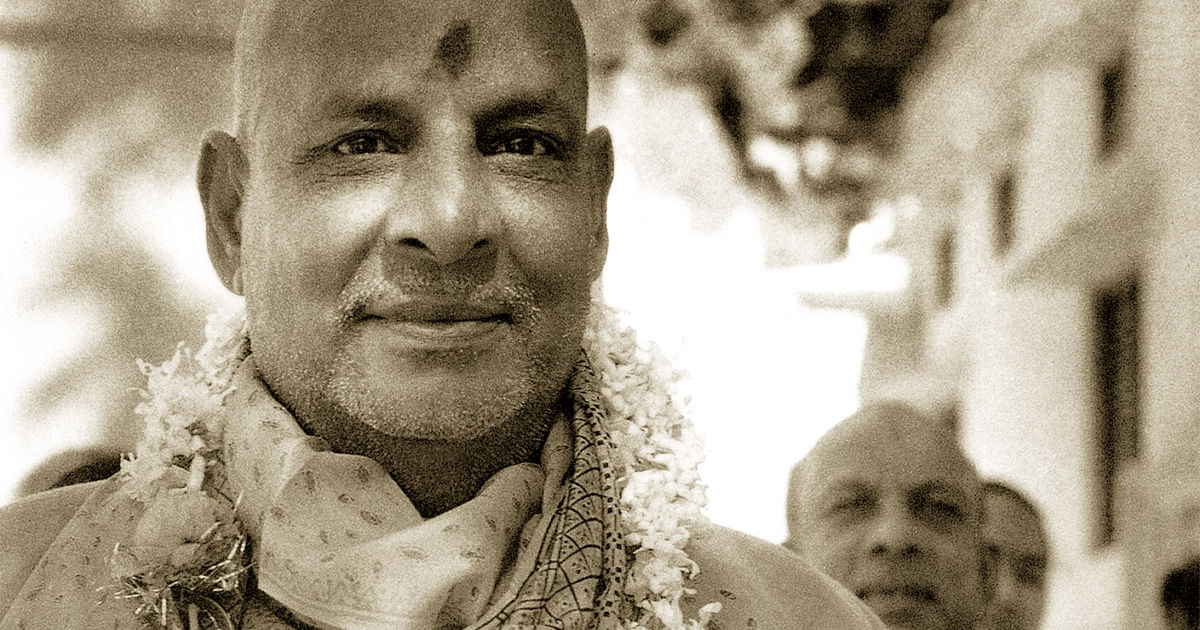What is spiritual knowledge? Who seeks it? We seek it. Animals are not interested in it and that is why they are animals. There would be no difference between man and animals if one lived only to eat and procreate. We must rise from this level and the pursuit of Yoga is the way. We enter the earth as humans after 84 million births. Continue reading
Tag Archives: spiritual
799 – Diksha
Diksha Initiation is like that extra burst of energy, which is required to propel you into space between you into the infinite space between you and the self. – Swami Satyananda Saraswati
339 – How can I become a Yogi?
I can become a yogi by practicing Karma Yoga and Jnana Yoga. Karma Yoga and Jnana yoga practice have to be combined. I have to fulfil my duties, whether I am a parent, sibling, friend, teacher, or mentor. I must remain committed to the demands placed on me. In order to develop the attitude of a karma yogi and jnana yogi. Continue reading
322 – Tantra as explained by my Guru
Following the spiritual life in today’s society of consumerism and materialism without creating discord and imbalance in our daily life is not an easy goal. The principles of Vedanta are too complex for us. We require some sadhana which is easy to understand and accept. Tantra is the middle way, and its master principle is: Continue reading
268 – Pain is my bestie
What is the description of pain? It is anguishing, excruciating, harrowing, causes dire suffering, heart and gut wrenching, aching, and vexatious. Pain is emotional, mental, physical and spiritual. It stays with us like a limpet, and we cherish it. Continue reading
Yoga talk with Swami Yogaswarupananda – Rishikesh – Manipur Univesity
Swami Yogaswarupananda from Rishikesh / Manipur University talks about yoga, krishna,  bhagavad gita and much more.
bhagavad gita and much more.
Here you can find:
Our online channels:
You can donate here
💛 Om Shanti 🕉
Podcast: Play in new window | Download
Subscribe: RSS
“Upasana Yoga and Nondual Devotion” – Yoga of Love – James Swartz
Nondual love means unconditional love. Maturity is important for a love
relationship. Free will and love. Means of knowledge. In the final stage you get rid of obstacles.
Here you can find:
Our online channels:
You can donate here
💛 Om Shanti 🕉
Podcast: Play in new window | Download
Subscribe: RSS
“Karma Yoga” Yoga Of Love – James Swartz
Om! Karma yoga stage: Love of God becomes a discipline. Basic universal rules Moral dimension in this universe. Noninjury. Every human being has a different kind of nature. There is not one thing that isn’t God. What is karma yoga? You have the right to act. Who gives the result?
Karma yoga stage: Love of God becomes a discipline. Basic universal rules Moral dimension in this universe. Noninjury. Every human being has a different kind of nature. There is not one thing that isn’t God. What is karma yoga? You have the right to act. Who gives the result?
Here you can find:
Our online channels:
You can donate here
💛 Om Shanti 🕉
Podcast: Play in new window | Download
Subscribe: RSS
“The big picture” Yoga Of Love – James Swartz
 Om!
Om!
If you know that you are love every relationship is a love relationship. You want to seek love or do you want to have love seek you? If you know that you are love every relationship is a love relationship. You are totally loveable is the starting point of Vedanta. You should self knowledge to solve your love problems. God is important in your life. What is yoga of love? Love is your nature. Five stages of devotion. You can express your emotions honestly to your God.
Here you can find:
Our online channels:
You can donate here
💛 Om Shanti 🕉
Podcast: Play in new window | Download
Subscribe: RSS
Overcoming anger with the vedic method of Neti-Neti | Pot-clay discimination to realise the self
 What is superimposition?
What is superimposition?
How do you discriminate between your true self and what you belief to be your self. Learn the vedic method of ‘Neti-Neti’. Don’t identify with your body. Why did Arjuna choose Krishna instead of getting a big army in the battle? Arjuna struggels when he sees who he is supposed to fight against. He gets unhappy, doesn’t want to fight. This is our situation: We are unhappy and are searching a fundamental method to get happy in life. Perception from senses is unreal. We need to restrain our senses, to see the reality. Pot-clay comparison. What changes, doesn’t exist. The ‘I’ doesn’t change, everthing that changes – emotions, personality, job – are names and forms. They appear to be real. But names and forms aren’t real. All we know is a product of a word and an appearance. They are passing. They don’t exist. You are unaffected by everything in this dream. All ideas are in your mind, just like in the dream. The only reality in the dream is the consciousness that we call ‘I’. Here is only consciousness, not mine, not you. Consciousness can’t be heard, touched. But it is self-illuminate. You know it exists. You’ll become more tolerant and less pulled by thoughts and objects. Listen to the sprinkling talk of Chandra Cohen for beginners. With humour and convincing arguments.
MORE VEDANTA ON OUR CHANNEL: Vedanta by Chandra Cohen
You are welcome to send a donate. Support our ashram with any amount. Thanks for your charity! Donate here
Om Shanti 🕉
Value management and attaining unconditional love – James Swartz – Yoga of Love, Bhakti Sutra
In the satsang we create a sattvic atmosphere that makes it easier
to focus on the knowledge. It is important to keep the knowledge
active when the mind is rajasic or tamasic. When the values are
assimilated the mind stays sattvic and the knowledge stays active.
A change in your lifestyle may be necessary to make the mind
sattvic enough. Deliberate thinking is observing the mind, step
back and think about it before you act. If necessary pause, collect
your thoughts, you can edit your thoughts as they come up. Pay
attention that the information is appropriate, kind, timely and
credible. Impulsive thinking has the need to react immediately. 11.
Dispassion towards sense objects, for example music, food, sex. No
obsession, except obsession for Vedanta. Assimilating these values,
starting with an intellectual understanding brings you a lot of
experiential and emotional satisfaction. 12. Renunciation and
Austerity. Eagerness to get rid of things and to live simply. Do not
accumulate stuff. 13. Absence of egoism. It’s about a simple
recognition about the difference between my (real) Self and the ego
(reflected self). Sadhana: Whenever you say the ‘I’ in the day-to-day
activities ask yourself which ‘I’ is meant. This helps to
discriminate. Keep track of your speech. Keep a short leash on your
ego and let it walk in front of you. 14. Appreciation of time. Don’t
waste time and go on with self-inquiry. 15. Absence of ownership. Is
it your body or your children? Everything comes from isvara.
Sadhana: Pay attention to the word ‘mine’. 16. Absence of
excessive attachment to loved ones. Serve the people in your field
with love but don’t get excessively attached. 17. Sameness of mind
under all circumstances. Cultivate the value of a quiet mind and for
sattva. Read the book Yoga of the three energies. Importance of
the management of the gunas. You can remove most of the
physical pain with guna management. Most of the daily pains are
caused by blocked prana or tamasic energy. 18. Non-dual devotion
to God. 19. Love of solitude. You can hear the silence speaking.
Gradually work to it if you have a busy life. 20. Absence of craving
for company. People can be in your life but you should have no
need for it. 21. Constant practice of self-knowledge. 22. Value for
completing or resolving things. Too much agitation prevents you
from finishing projects and brings to starting new ones. Karma yoga
reduces your karmic load. The degree to what you reduce your
karmic load is the degree to what your mind is peaceful. Tamasic
people don’t want to complete things. Rajasic people want to
complete things but they are too busy to do the completion.
Consequence is that they are always agitated. 23. Precaution,
deliberation and restraint. Think ahead and make a plan before you
judge. Value for holding back. Rajasic people want to do things
immediately. If you can’t hold on you find yourself doing a lot of
things you don’t have to do. 65. Offering all activities to the Lord,
one should direct negative feelings – desire, anger and pride – to
Him. 66. Transcending the gunas, the devotee should act only out
of pure love of God and remain perpetually in the relationship of a
servant to his master or a lover serving her beloved. 67. Among the
Lord’s devotees, the greatest are those who are dedicated solely as
intimate servants. Sakhya bhava and further bhavas. Secret love
affair with God behind the back of your husband. What is your
dominant way to express your love? Love with understanding is
better than only emotional love, for example sakhya bhava. 68.
Conversing among one another with throats choked, hair
standing on end and tears flowing, the Lord’s intimate servants
purify their own followers and the whole world. 69-83. 84. Anyone
who has faith in these auspicious teachings will attain non-dual
devotion. Indeed he or she will attain unconditional love.
More: Vedanta Seminars.
More on: Vedanta.
Learn more about: Yoga Vidya.
You can sign up for: our online seminars.
You can also support us by: donating.
Podcast: Play in new window | Download
Subscribe: RSS
Jealousy, consistent effort and mastery of the mind – James Swartz – Yoga of Love, Bhakti Sutra
These values are qualifications for moksha. When you are
spiritually stuck it’s probably because one or more spiritual values
are only partially assimilated. When you are not up to the mark,
pick a value and work on it for 1-2 months. It’s a constant practice.
When you find a consistent pattern of frustration, anger or
depression there is some value that needs work. Apply the opposite
value. If you are a selfish person then learn how to be generous.
Value management is extremely important. 8. Jealousy and Envy:
Rajas is the problem. Don’t compare yourself to others. If you don’t
know who you are the bad values are obstacles and the good
values are helpful. Pay attention with comparisons that make you
feel inferior. Nobody is trying to make you feel inferior. You have to
make yourself feel inferior or superior. Comparison leads to
competition and competition leads to violence, anger and
sometimes destruction. Jealousy and Envy are transformed anger
and they usually lead to depression. You are never jealous of a
whole person only of an aspect. In other words, jealousy is a
projection that masks an insufficient appreciation of my own nature
and the abundance of good qualities that spring from it. A self-realized
person is never jealous, because she is mindful of her
fullness. The Bible’s statement that God is “a jealous God” means
that when you know God you cannot love anything else. Shiva
means what is always good at any place and time, that’s me the
self. Ask yourself: ‘Why do I feel guilty?’. Without following dharma you
won’t get enlightened. When I feel jealousy I should apply the
opposite thought. If you realise that you are greedy try to be
generous. Give 5 or 10 Euros to a beggar. When you break one of
isvaras rules you should feel guilty. 9. A consistent effort to achieve
a stated goal is required for self-knowledge because self-knowledge
is not partial knowledge like worldly disciplines. Tapas with
steadiness and devotion over a long period of time is necessary for
self-realization. As the gunas are constantly changing the tapas
should take guna management into account. 10. Mastery of mind:
4 types of thinking. Impulsive, mechanical, deliberate thinking and
spontaneous thinking. Idea of instant gratification is a problem.
Fast food: I want my food immediately. The mantra of impulsive
people is: If it feels good do it. Better mantra: if it feels good think
about it before you do it. You are bored to death doing and thinking
the same things. Then you need entertainment, for example
different food every day: You live to eat. If your mind is mechanical
or impulsive it is not under your control. Convert these types of
thinking to deliberate thinking with the help of Vedanta. Applying
the opposite thought or always thinking from a non-dual
perspective. Intuition is normally impulsive thinking. Learn to think
like god from a perspective of love. Learn to think useful thoughts
and avoid useless thoughts. Channeling. Value of visions. Meaning
of angels and demons. Being separated from god is painful.
More: Vedanta Seminars.
More on: Vedanta.
Learn more about: Yoga Vidya.
You can sign up for: our online seminars.
You can also support us by: donating.
Podcast: Play in new window | Download
Subscribe: RSS
Reincarnation, non-dual love and gunas – James Swartz – Yoga of Love, Vedanta, Bhakti Sutra Narada
Free will. Making no choice and turning it over to ishvara.
Issue of free will: what values are determining your use of
free will? Those values are chosen by the gunas. If tamas
predominates fear will inform your choices. If rajas
predominates desire will inform your choices. The self has
no values. It is value-neutral. Reincarnation view: this
person will transmigrate and will be the same person in the
next incarnation. The person‘s karma is coming along with
them. But: when the body goes this person is never coming
back. The only thing that transcends time are the subtle and
the causal body. The circumstances of the next birth will be
different. You will have a new identity. The person that you
think you are is a conceptual person, no actual person. You
claim that subjective and objective events equal ‚I‘.
Transmigration: What reincarnates is the subtle body
powered by the vasanas. Your parents will be selected by
ishvara according to your vasanas. Non-eternal jiva. Eternal
jiva is consciousness. It is the same ‚I‘ for everyone and it is
eternal. Irrelevance of the personal story and the
experiences of the person when you know your nature. ISense
is an image or a reflection of the I. The reflection is
not the Self. Vedanta is a complete teaching. Since we are
multi faceted people we need to understand the self from
different angles. 360 ° knowledge of the self and the world.
Verse 51: „The essential nature of pure love of God is
beyond description.“ But you can know it. Verse 52: “Trying
to describe the experience of pure love of God is like a
mute trying to describe a particular taste.” Verse 53:
„Occasionally, pure love of God is revealed in a qualified
person.” In great souls you find this kind of love that is
totally different from worldly love. Verse 54: “Pure love of
God is devoid of material qualities and desires, manifests
more and more every moment, is uninterrupted and is
always experienced as one’s innermost consciousness.”
Verse 55 “Having discovered non-dual love, you see only
the self everywhere, hear the self in every word, speak only
of the self and think only of the self.” You can discover love
but you can‘t make it happen. You get rid of your concepts
and discover that you are love. The gunas influence the way
you experience love. Then it is love conditioned by the
gunas. Verse 56 “Secondary devotional service is of three
kinds, according to which of the gunas predominates at any
time or according to the motivation – distress, desire or
knowledge – that brings one to devotion.” Verse 57: “Each
succeeding type of devotee is superior to the preceding
type.” Rajasic devotees are superior to tamasic devotees,
sattvic devotees are superior to rajasic devotees and nondual
devotees are superior to sattvic devotees. You need
rajas to get out of tamas. Tamas means you live in a fantasy
world. In rajas you are driven by ambition. You need sattva
and knowledge to get out of rajas. Self inquiry renders the
gunas non binding, so you can overcome attachment to
sattva.
Podcast: Play in new window | Download
Subscribe: RSS
Ignorance, guru and change of attitude – James Swartz – Yoga of Love, Vedanta, Bhakti Sutra Narada
Trust in a guru? Manipulation and guru. Respect teachers with
knowledge. Don’t hand over your trust to a teacher simply
because you are suffering. If your heart is pure ishvara will give
you the right guru. You should be able to recognise fear in you
and root it out. What is maya? You have to act to change your
life. Change your attitude, start loving the right things and do
dharmic actions that produce beneficial results, i. e. sattva. If you
surrender and stay passive your life won’t change. Justifications
to keep negative thoughts don’t make sense. You punish yourself
when you hang on to negative thoughts. Low self esteem
motivates you to punish yourself. It’s just as easy to trust.
Associate with good people and good thoughts. Spiritual people
are samsaris dressed up in spiritual clothes. Tanmatras. Causal
body causes you to do actions to feel better. Problem is that you
have the wrong idea of who you are in the first place. Enlightened
people are happy to turn over their karma to ishvara. Shankara:
Self knowledge removes ignorance as light removes darkness.
The thought ‘I am small, I am inadequate’ generates all the
actions to feel better. Destroy it with the opposite thought.
Obstacle is attachment to ignorance. Ignorant people defend their
beliefs when you suggest an alternative attitude. Ask yourself: is
there any evidence that something is wrong with you? You should
question what you have been told in light of your values and
svabhava. A feeling is not a command. The tendency to fool
yourself is very strong. A real guru and the scripture prevent you
from that. You have to put you in a situation where you don’t get
egoic. Vers 48: “Who is capable of crossing Maya? The one who
transcends the pairs of opposites and renounces the materialistic
point of view.” You are valuable with normal hair. You don’t have
to be special. Vers 49: “Who is capable of transcending Maya?
The one who renounces even the Vedas and obtains exclusive
and unbroken love of God.” You contribute your love to the world.
Here you can find more: Vedanta Seminars.
More on: Vedanta.
And: English Community, Blog, Seminars.
Podcast: Play in new window | Download
Subscribe: RSS
Association with materialists or sages? – James Swartz – Yoga of Love, Vedanta, Bhakti Sutra Narada
 Revision of verses 38-43. Vedanta is a method that the teacher
Revision of verses 38-43. Vedanta is a method that the teacher
applies to your mind. You are always aware. Elimination of nonessential
factors. Bliss in deep sleep. Do you stop existing when
you go to sleep? Something that you can never dismiss is real.
The scripture is never wrong. The problem is in my
understanding. Consequences of association with negative
people. Verse 44: Association with materialists causes anger,
confusion, forgetfulness, loss of intelligence and total spiritual
calamity. Verse 45: Rising like waves from association with
objects, these bad effects amass into a great ocean of misery.
You get a big samskara. Verse 46: Only those who abandon
material associations, serves the sages and becomes selfless
crosses beyond maya. Verse 47: The one who avoids society,
loves solitude, lets go of the belief that there is security in worldly
situations and transcends the gunas crosses beyond maya. You
don’t want to change your state of mind. Gunas teaching.
Awareness and the creation of the world. Causal and subtle body.
Here you can find more: Vedanta Seminars.
More on: Vedanta.
And: English Community, Blog, Seminars.
Podcast: Play in new window | Download
Subscribe: RSS







